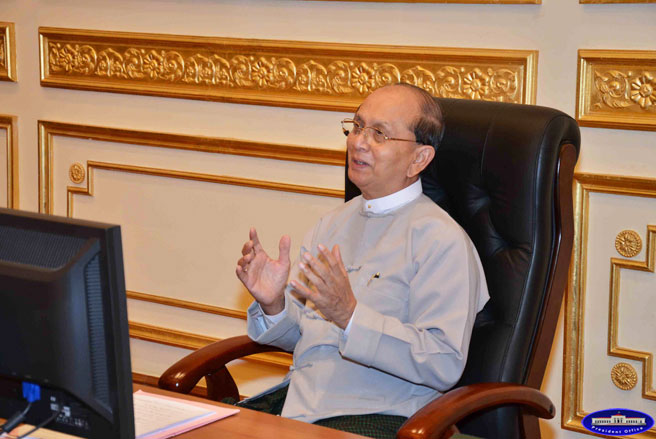In a radio address to the nation on Tuesday, President Thein Sein began by praising those involved in hosting the successful World Economic Forum in Naypyitaw last month.
 “This is a strong indication that the international community is watching and is interested in working together with us as we strive to reconnect with the global community,” he said, re-iterating his interest to “promote Myanmar to international investors.”
“This is a strong indication that the international community is watching and is interested in working together with us as we strive to reconnect with the global community,” he said, re-iterating his interest to “promote Myanmar to international investors.”
On addressing the recent violent clashes between Myanmar Buddhists and Muslims he highlighted a need to take action against “a small group of individuals that uses religion as an excuse to cause fear, spreads hatred between different faiths, and promotes personal political or economic gain from the suffering of others have international impact on the safety and well-being of our fellow citizens.”
He said, “My heart goes out to the relatives and loved ones of the victims of these attacks. A critical lesson we must draw from these events is that our actions at home have impact on our fellow citizens living and working abroad.”
He promised that in the face of recent events that Myanmar authorities would work towards a more serious effort to safeguard persecuted ethnic groups as well as bringing perpetrators to justice.
“We will be resolute in taking action in accordance with our laws against those who spread fear and deepen hatred between groups and communities of different beliefs and we will work hard to prevent future occurrence of such crimes,” he said.
With the International Labor Organization (ILO) lifting all its remaining restrictions on Myanmar last month, President Thein Sein emphasized the importance of the ILO’s confidence in the government’s reforms with regard to forced labor.
He explained: “Full membership of the ILO will aid not only our country’s economic development but also strengthen safeguards of labor rights.”
TIME magazine’s public backlash in Myanmar also featured strongly in his address.
He stressed: “The cover story of the magazine depicting a few individuals who are acting contrary to most of Myanmar, is creating misconceptions of Buddhism… my government accepts that as a country takes its initial steps towards democracy, there may be different points of view expressed by sections of the public and national and international media.”
On continued efforts to “accept plurality of opinions and reinvigorate civil society,” Thein Sein stated his position on the importance of freedom of expression: “I strongly believe that the right of freedom of expression should be exercised in light of the prevailing delicate political dynamics and for a constructive purpose.”
The President explained that from the public uproar towards TIME magazine’s “misrepresentation of Buddhism,” he urged the public to see how best to constructively reflect on approaches towards “consensus-building, and calming outbreaks of violence.”
In making these points, he said, “my intention is to not ignore internationally accepted democratic norms but rather to invite constructive observations and advice.”
The address concluded with a brief mention of presidential ‘peace-building’ meetings with the RCSS/SSA (Shan State Army) and continued discussions with the KNU and KNPP.
“You will be happy to hear that these developments to our peace-building process are bringing the prospect of lasting peace desired by our citizens, step by step into view,” he said.
He finished by stating: “I will do everything I can to create a better life not only for you all but also for all future generations.”


